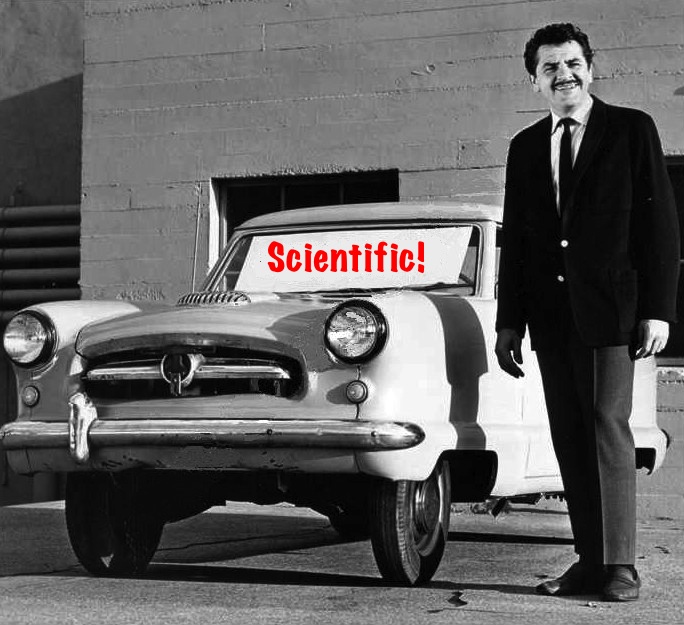A clever way to convince yourself or others your religion is true is: claim that it’s science.
Spinning sciency sounding jargon into book titles or language doesn’t necessarily make it scientific.
Calling something “science” or “scientific” when it isn’t is misleading, maybe even unethical. Why?
When the word science is used in marketing copy we associate the product with our ideas of sterile laboratories, petri dishes, test tubes, verified facts, clinical experiments, and approvals from bona fide scientific communities of spectacled, PhD geniuses wearing lab coats. When “science” is used we are led to believe the product being promoted has been verified by scientific method.
What genuine science is able to say about the benefits of meditation is interesting. I spend hours each week reading articles, scientific- and scholarly-texts, and examining the intersection of science and meditation.
Red flags should go up immediately when we see the word “science” used to promote products or worldviews that aren’t really scientific. This would include 98.9% of meditation, Buddhist, and spiritual products that use science.
Paramahansa Yogananda and the Self-Realization Fellowship (in whose monastic order I was formerly ordained) flaunt the word “science” in these yoga-meditation book titles:
- The Science of Religion
- The Holy Science
- Scientific Healing Affirmations
- The Yoga of the Bhagavad Gita: An Introduction to India’s Universal Science of God-Realization
- God Talks With Arjuna — The Bhagavad Gita: Royal Science of God-Realization
In The Science of Kriya Yoga, Chapter 26 in the Autobiography of a Yogi1, Yogananda makes the hard sell that his version of yoga meditation is “science”. These are only a few of the glaring examples when “science” is used to sell products and promote a religious worldview.
Buddhist authors are no less guilty of spinning science into their marketing copy and product titles:
- The Quantum and the Lotus: A Journey to the Frontiers Where Science and Buddhism Meet
- Buddhism and Science: A Guide for the Perplexed (Buddhism and Modernity)
- Contemplative Science: Where Buddhism and Neuroscience Converge
- Buddha’s Brain: The Practical Neuroscience of Happiness, Love, and Wisdom
- The Universe in a Single Atom: The Convergence of Science and Spirituality
There’re 2000+ books under Buddhism Science/Religion & Spirituality books on Amazon.
Type these search terms into Amazon’s Religion & Spirituality catalog: science, quantum, scientific, and physics. You will find tens of thousands of sciency-sounding religious products.
I don’t blame sincere Yogis, Buddhists, and Spiritual-seekers for believing their religion or practice is true. Sincerity doesn’t make claims true, ethical, nor scientific fact. It’d serve Seekers to do objective, independent research before they buy these “scientific” products. Would you buy a car just on the car salesman’s word?  You verify before you buy that what is being sold is a reliable vehicle. You research Consumer Reports, Kelly Blue Book, and ask your mechanic to check under the hood. I now do my homework and plenty of skeptical inquiry before buying anything important.
You verify before you buy that what is being sold is a reliable vehicle. You research Consumer Reports, Kelly Blue Book, and ask your mechanic to check under the hood. I now do my homework and plenty of skeptical inquiry before buying anything important.
Weaving sciency-sounding jargon into marketing copy no longer tricks me. I wish earlier in life I’d known the difference between genuine science, pseudoscience, and marketing using “science”. I probably would not have bought, consumed, and committed so many hours and years to highly questionable products. Granted there can be some helpful advice and inspiring ideas in them. Wishful thinking makes me want to believe and hope for miraculous enlightenment. But, I now realize wishing or calling things “science” doesn’t make them true or real.
Question for readers: When would use of “science” NOT be misleading in spiritual-product marketing?
You may also be interested in reading:
How to Quack-Proof Yourself Against Pseudoscience
Is Meditation Overrated? Scientific Evidence Is Scant, says Scientific American
Meditation: A stress reliever, but not a panacea
Notes
1 The Science of Kriya Yoga, Chapter 26 in the Autobiography of a Yogi


Sincerity doesn’t make it true. Good line. Words like science and spirituality are fairly squishy, like pretty much all terms when used in religious contexts. Thanks for the post.
I agree, Chris. Many terms are squishy, overused, or misused. Take the word love for instance. Maybe clarification or agreement about terms or what we mean by certain words helps sometimes. It’s all made up by humans. But nature, the universe, marches on. Thanks.
There is a fascinating documentary about this this idea with a guy named Ben Stein all about a concept called “Intelligent design”. Movie is called Expelled. Great blog post
Ah, yes. “Intelligent Design” (ID) I hear about it periodically in the news. Fundamental religionists in the U.S. used to call ID “Creation Science”. But the U.S. Courts said it was religion, was not science, and could not be taught in public schools for separation of church and state.
Apparently, ID is still being taught in many public schools. I’ll look for the “Expelled” documentary you recommend. Ben Stein is smart and dead-pan funny. Thanks for your comments.
It’s interesting to learn that me ole “guru” Maharishi Mahesh Yogi was not the first spiritual teacher to use the Science-meme to promote spirituality. However, I believe he is the first to actually call for scientists to actually EXPLORE spirituality using science. The concept was so foreign that he had to defend his stance to his students:
“Every experience has its level of physiology, and so unbounded awareness has its own level of physiology which can be measured. Every aspect of life is integrated and connected with every other phase. When we talk of scientific measurements, it does not take away from the spiritual experience. We are not responsible for those times when spiritual experience was thought of as metaphysical. Everything is physical. Consciousness is the product of the functioning of the brain. Talking of scientific measurements is no damage to that wholeness of life which is present everywhere and which begins to be lived when the physiology is taking on a particular form. This is our understanding about spirituality: it is not on the level of faith –it is on the level of blood and bone and flesh and activity. It is measurable.”
.
His students took him at his word. Robert Keith Wallace published his physiology PhD research in the journal _Science_ in 1970: http://www.ncbi.nlm.nih.gov/pubmed/5416544 . It’s generally acknowledged as the first “modern” (conducted in a laboratory setting) study ever published on meditation.
26 years ago, Keith published a book _The Neurophysiology of Enlightenment_ which attempted to describe, well, enlightenment. He makes one very important point that that I’ll attempt to summarize as his writing style is rather dense:
Early TM studies didn’t make a distinction between the average changes that take place during meditation, and changes that take place during the “pure consciousness” state that can occur during meditation. Later studies, using more sophisticated equipment and analysis techniques DO make such a distinction, and attempt to distinguish “substates” within the meditation state itself.
Such research is ongoing and as our understanding of human physiology grows, meditation research will become more sophisticated. This same refinement process applies to any kind of study on any kind of meditation.
.
And that leads to the answer to your question: “When would use of “science” NOT be misleading in spiritual-product marketing?”
THAT depends on whether or not you think the use of science is appropriate for marketing, period.
The TM organization, is well-known for making use of the positive results of small pilot studies to push the practice of TM, but that would be true of every enterprise, if there were not laws against it. Even in the field of medicine, the FDA guidelines are pretty minimal compared to guidelines for best practices in building bridges or designing airplanes and if people could get away with advertising medicine the way TM is promoted, they certainly would -the profit motive is very strong. Ironically, True Believer’s desire to see everyone do what THEY think is good is probably a bigger motivator than money ever could be, at least for most people.
Here’s a question for YOU:
what would you do if you thought the results mentioned in this article were NOT a fluke?
http://www.sfgate.com/opinion/openforum/article/Meditation-transforms-roughest-San-Francisco-5136942.php
@saijanai: When claims are made in marketing, religion, or politics, anywhere, the burden of proof is on the claimants to provide valid arguments, evidence, or verifiable data. Proportion belief to the evidence, is a good rule of thumb. Critical thinking, skepticism, discernment seem to feel unnatural, but good methods to balance our wide and wild range of intuitions or feelings is smart.
Trouble is many claims or results are not easy to isolate as having one cause. Is lowering of violence at San Fran High School the result of meditation? What if a control-group were setup to compare The Quiet Time results with random participants who instead used Quiet Time for naps, kisses, or floats in tanks of water? Meditation is a beneficial activity, for some. Yet, many other activities (introspective or external) could yield similar results.
To your question: I don’t doubt the SF School’s Quiet Time produces results. Nor that meditation produces results. How are results measured and compared? Straight-forward, black and white answers and thinking is scary, especially with complex problems and people. I’d caution against jumping to conclusions.
Thanks for your question and comments
“Expelled” is not tongue in cheek, or a satire about the silliness of ID. It is an attempt to encourage the teaching of ID in schools based on “freedom of speech” and the rights of religious idiots to indoctrinate their young (and the rest of us!) with their dearly held beliefs. Ben Stein may be funny, but not so smart as far as this film is concerned.
For a critique of this ‘documentary’, see Scientific American issue April 16, 2008…
Observation of phenomena, formulating hypotheses, testing through direct experience and devising theories to me are applicable and valid uses of scientific method. The intention behind the use of the word science in relation to marketing any theories about a view of reality is significant to me. Skepticism is personal responsibility and a healthy part of the testing process in my view. Thx for this interesting article!
Thanks Joan. I agree. I wonder what your “tests” have resulted in as far as you practicing meditation– you do it more, less, not at all? You follow a particular spiritual teacher or techniques? Searching, found, or stopped your meditation project because of “tests”?
Hi, what a refreshing perspective. The questions we think need to be found before we carry out any more experiments are:
Is it even right to promote mind and body practices in the same way as the pharmaceutical industry sells us pills?
Is the pharmaceutical industry the most appropriate business model for this?
Is the pharmaceutical industry model really what the community of interest is interested in pursuing?
The Relativity of Right: Yoga and Meditating for Health (docs.yuj.it/people/matwitts/archive/articles/yoga-scientism)
Thanks for sharing your list of questions, Mat (yuj.it). I’ll checkout the full article on your blog.
@SkepticMeditations
The University of Norwich has been using Transcendental Meditation for 5 years now. They did their own in-house research with experimental and control groups and now offer it to anyone who is interested:
Transcendental Meditation at Norwich University https://www.youtube.com/watch?v=8WhC7Jex0Kk